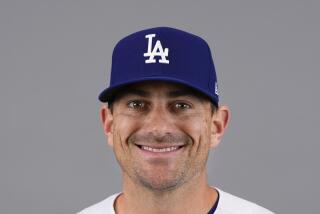Today’s Patient Called ‘Perfect Candidate’ Because of Overall Health : 3rd Artificial Heart Recipient Tells Confidence
- Share via
LOUISVILLE, Ky. — Murray P. Haydon, the retired auto worker who is to become the world’s third artificial heart recipient, goes into the operation today “full of confidence” and in much better overall health than either of his predecessors, one of his doctors said Saturday.
“We feel he will be a much more adequate test of the mechanical heart and its function than anyone before him,” said Dr. Allan M. Lansing, medical director of Humana Heart Institute International and a member of the surgical implant team.
Lansing said Haydon is aware that the two previous recipients, Barney Clark and William J. Schroeder, suffered neurological problems after their implants. But “he feels this is a different situation, that he’s a different individual and that this will not happen to him. And I agree with him,” Lansing added.
Meanwhile, a persistent fever that Schroeder has had for about two weeks was subsiding, and he was again gaining strength, Lansing said. The fever was a reaction to a drug used to control mild seizures, and the medication has been changed, the doctor added.
No Previous Surgery
Unlike Schroeder, whose hospital room is only two doors away from his, Haydon, a white-haired 58-year-old Louisville resident, has had no previous surgery. Aside from the severe heart disease and the loss of 25 pounds in the last month that has left him thin and ashen, Haydon has no significant health problems.
“I have a good feeling about this patient,” Lansing said. “I feel much more confident than I did before Mr. Schroeder’s surgery.”
Lansing described Haydon as “completely full of confidence” about the operation, which is to begin this early morning at Humana Hospital Audubon.
On Saturday, Haydon went upstairs to see his new grandson, Daniel Murray Haydon, who was born Friday in the same hospital.
Haydon and Schroeder have not met, but Schroeder’s wife, Margaret, hugged Haydon’s wife of 32 years, Juanita, as they met in the hospital, and they talked briefly.
Surgery to implant the artificial heart is Haydon’s only hope for surviving more than a few weeks, Lansing said. Like Clark and Schroeder, Haydon has chronic congestive heart failure, but he is not as critically ill as either of his predecessors were at the time of their operations.
Nevertheless, Lansing said, without the implant Haydon would grow weaker quickly and soon die.
“He would rather take the leap now than wait until he’s on his last gasp,” Lansing said. Haydon was turned down for a heart transplant at Humana and at a hospital in Indianapolis because he is considered too old, the surgeon said.
Haydon and his family have “an extremely positive outlook” and have already been asking questions about how to handle the drive system for the heart once it is in place, Lansing said.
Dr. Jerome Lacy, Haydon’s Louisville cardiologist, called Haydon “the perfect candidate” because of his overall health. “His heart is his only real problem,” the doctor said.
Dr. William C. DeVries will lead the surgical team, implanting the same model Jarvik-7 heart that has kept Schroeder alive for 84 days. Haydon’s operation is the third of seven for which DeVries has approval from the Food and Drug Administration.
But the neurological problems that followed the first implant in Clark and a stroke suffered by Schroeder Dec. 13 make this implant perhaps a pivotal one for the artificial heart program.
Factors Look ‘Hopeful’
“It would be very distressing to find a neurological problem in someone in whom all other factors look so hopeful,” Lansing said. “It would cause me to look very seriously,” at the research project, he added, “but I’m confident that that’s not going to happen.”
Clark, the Seattle-area dentist who received the first mechanical heart in 1982, had chronic lung and respiratory problems as well as seizures days after his surgery. He was rushed into surgery earlier than planned and lived 112 days with the plastic-and-metal device.
Schroeder had two problems that worried doctors before his Nov. 25 operation. His diabetes increased the chances of complications and the scar tissue remaining from coronary bypass surgery in 1983 made the implant surgery more tedious.
Six hours after the implant, doctors took Schroeder back to the operating room to stop internal bleeding that they believed was caused by the old scar tissue.
Because of the bleeding, drugs used to thin Schroeder’s blood and prevent a stroke were not administered until several days after surgery. He suffered a stroke caused by tiny blood clots 2 1/2 weeks after the operation.
Haydon has no such risk of excessive bleeding and will receive anti-coagulant medication earlier than Schroeder did, perhaps within 24 hours of surgery, to prevent clots from forming, Lansing said.
Despite the physical differences, Haydon, like Clark and Schroeder, has a stable personal background and strong family support. His new grandson is the fifth for him and Juanita, who have three children.
Haydon, a pack-a-day cigarette smoker for 40 years, quit smoking and quit drinking alcohol after he was diagnosed as having heart disease in 1981.
He took a medical retirement from the Ford Motor Co. truck plant here last year, and a week ago his children asked Lacy about the possibility of a heart implant.
“He began to feel himself wasting away” and his medication was no longer working, Lacy said.







